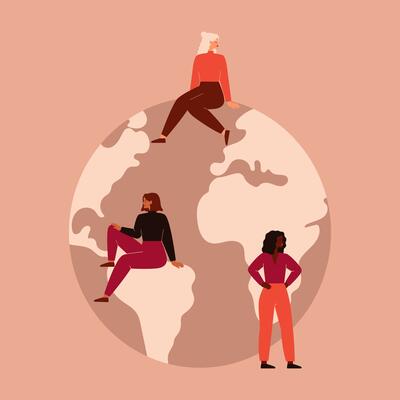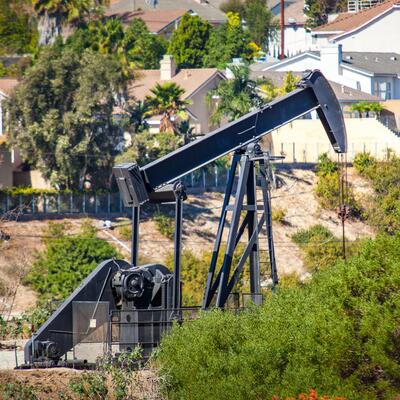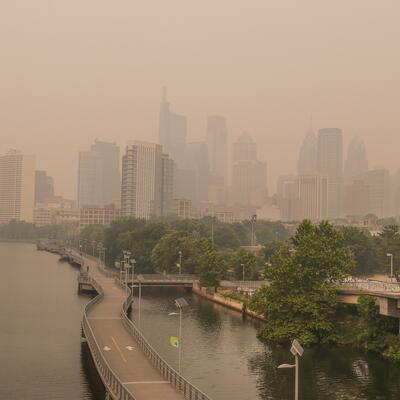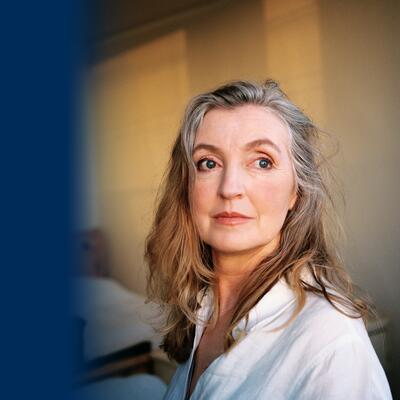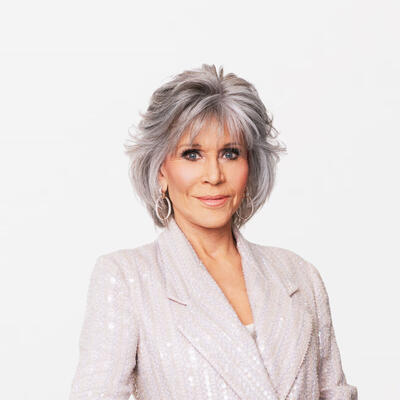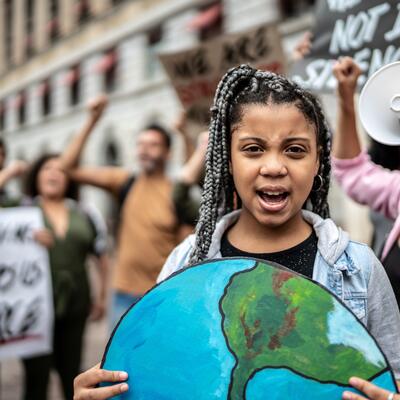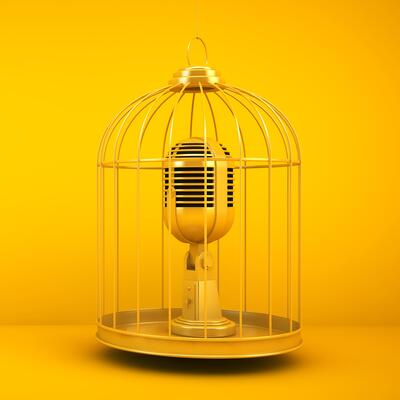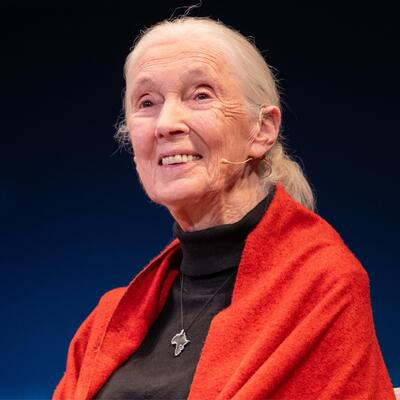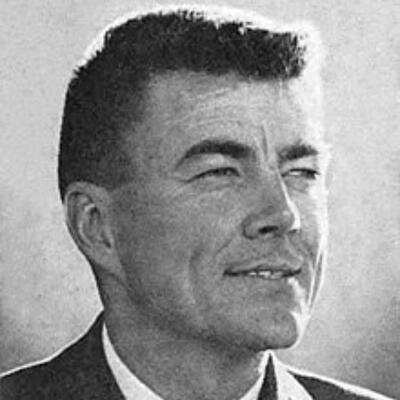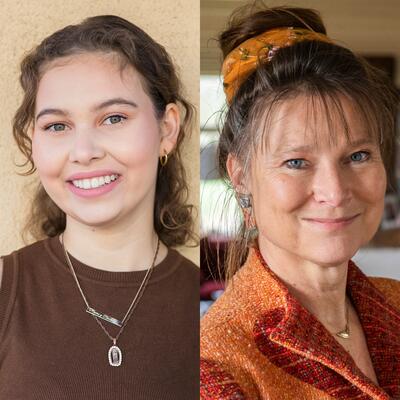
Two Heroes Challenging the Powerful
Guests
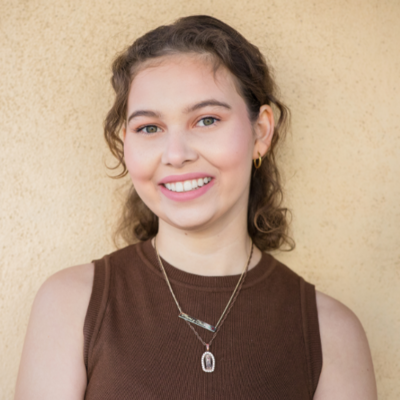
Nalleli Cobo
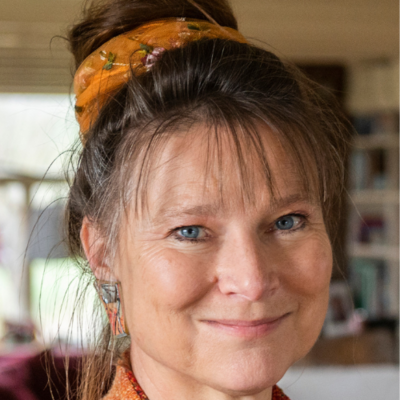
Marjan Minnesma
Summary
Making the necessary changes to address climate disruption will take massive collective action. But sometimes, a single individual can make an extraordinary difference. At age nine, Nalleli Cobo, suffering headaches, heart palpitations, nosebleeds, and body spasms, became an activist, driven to fighting to shut down the local oil in Los Angeles well responsible for her ailments. Separately, Marjan Minnesma brought a historic lawsuit holding the Dutch government accountable for its failure to protect its citizens from climate change. For these activists, addressing climate disruption isn’t just about preventing future harm, it’s about instigating change now.
Episode Highlights
1:46 Nalleli Cobo on her personal story
6:44 Nalleli Cobo on the beginning of her activism
12:32 Nalleli Cobo on balancing her personal life and activism
13:57 Nalleli Cobo on getting Senator Senator Barbra Boxer’s attention
27:18 Marjan Minnesma on the reality of Dutch emissions
31:21 Marjan Minnesma on developing crowd pleading as a legal tactic
36:40 Marjan Minnesma on the ripple effects of the court case
39:11 Marjan Minnesma on the choice to sue governments not corporations
45:12 Marjan Minnesma on influencing the solar market
Resources From This Episode (4)
Full Transcript
Note: Transcripts are generated using a combination of automated software and human transcribers and may contain errors. Please check the actual audio before quoting it.
Greg Dalton: This is Climate One. I’m Greg Dalton.
Ariana Brocious: And I’m Ariana Brocious.
Greg Dalton: We know that making the necessary changes to address the climate crisis will take massive collective action. But sometimes, individuals can make an extraordinary difference.
Ariana Brocious: In this episode we’ll hear from two people who stood up to very powerful entrenched interests and won.
Marjan Minnesma: It's really remarkable to see within a few years, how many court cases all over the world sparked off and were inspired by our case.
Greg Dalton: That’s Marjan Minnesma, who spearheaded a groundbreaking legal victory holding the Dutch government accountable for its failure to protect its citizens from climate disruption. We’ll hear my conversation with Marjan later in this episode.
Ariana Brocious: But first we’ll hear my conversation with Nalleli Cobo, Cofounder of People Not Pozos, which translates to People Not Oil Wells, and describes itself as a grassroots campaign dedicated to the prioritization of people over corporate profits.
Greg Dalton: Nalleli grew up in Los Angeles, which has the dubious distinction of having the largest urban oil field in the nation.
Ariana Brocious: And she successfully led an effort to shut down the oil well that took a devastating toll on both her and the community. She won the prestigious Goldman Environmental Prize for her work when she was just 20 years old – work that began when she was nine.
Nalleli Cobo: I didn't realize what I was up against. I just thought I was fighting grown-ups. I did not understand that I was fighting big oil.
Greg Dalton: Her efforts didn’t just get that one local well shut down; they led to the phase down of oil extraction in all of Los Angeles, the most populated county in the country.
Ariana Brocious: She really is inspiring and has a remarkable story. We started the conversation with Nalleli’s personal journey.
Nalleli Cobo: So, at the age of nine, I started getting really sick out of nowhere and I was always a healthy girl, so that was a cause for concern. It all started with a nosebleed and the first nosebleed we didn't think much, you know, I probably didn't drink enough water that day it was probably too hot outside. But the nosebleed came back three times that week. And every time they came by it was more and more intense. It got to the point where the nosebleeds got so intense, I couldn't sleep in my own bed anymore. I would have to sleep in a chair to prevent choking on my own blood. I developed asthma and that’s something I’m always gonna have to live with now. I had heart palpitations and I had to use a heart monitor for several weeks. I got body spasms that were so intense I couldn't walk. My mom would have to carry me from one place to the other. Unfortunately, the list goes on and on and it wasn't just me. My mom developed asthma at 40 which is really rare, and my grandma developed it at 70 which is unheard of. It was a common conversation starter for a parent to stop each other in the streets and say, my son is in the hospital from an asthma attack. How's your daughter’s asthma? Or my son is in the ER. Can you help me pick up my other kids from school? And that's not normal.
Ariana Brocious: It shouldn't be normal. Sounds like though that you were obviously not alone in experiencing this. Though maybe your case, your symptoms were more severe than some other people. How did you connect the health symptoms that you just described with the oil well in your neighborhood?
Nalleli Cobo: So, when drilling for oil there are a lot of toxic emissions that are released into the air and it typically smells like rotten eggs, just really gross. Something the oil well in my community did was add even more chemicals to mask the smell. So then, my community would smell of guava, chocolate, cherry, citrus. And the smell was constant. It was a smell that just as soon as you took a breath and inhaled you were sick to your stomach. And the smell became more and more common. And out of nowhere this smell started occurring. We originally thought that something was wrong within the building that we were living in, you know, a leak, plumbing issues or some sort. And we started contacting the executive director of the organization that owns the affordable housing building. And we started calling them and they said, no, I assure you the building is okay, it's most likely the oil well across the street. And we said, the what? And it was up to us to become the experts and start learning what was going on in our community. So, we started calling the South Coast Air Quality Management District and filing complaints. And then it was we’re very fortunate to have Physicians for Social Responsibility Los Angeles, PSR-LA, sent a toxicologist to come speak to my community. And that’s when we officially connected the dots and said, oh, this chemical use during oil extraction causes X, Y, and Z symptoms and that's what we're experiencing.
Ariana Brocious: So, you didn't know there was an oil well that close to your house?
Nalleli Cobo: I didn't.
Ariana Brocious: Did your parents know, did your family know?
Nalleli Cobo: The well wasn't operating because oil prices were low before. But then with the spike in 2010, 2009 they started resuming operations. But they didn’t alert the surrounding community that they restarted operations.
Ariana Brocious: Okay. So, it had been dormant maybe when you were even younger and then they restarted the activity. Wow. Okay. So, you’ve mentioned, you know, that you began to kind of or your mom began to draw attention to this try to get some awareness. And frankly oil companies can be kind of intimidating and I'm kind of curious where you and your mom got the momentum and the courage to challenge them.
Nalleli Cobo: It's funny because the night I found out that we were living next to an oil well. My mom had said, oh, the smell that's been going on is from an oil well. And I was like, oh, that make sense. And I was like, wait, what’s an oil well? Actually, that does not make sense. And I had to learn what an oil well was at the age of nine. And the night we found out the next morning, oh my God, I cry just thinking about it. The next morning my mom and I crossed the street and we started reading every single sign that was on that oil well wall. And the sign that has stuck with me the most is the sign that says dangerous chemicals known to the state of California to cause cancer, birth defects and reproductive harm. And I'm aware that’s Prop 65 and it’s everywhere. But this isn't on the wrapper of a candy bag that I just got. This isn’t on a label for the new laptop, you know, this is on an oil well wall 30-feet from people's homes. This oil well operates with nine surrounding schools in the area. And when I started my work, I never thought I think it was also because I was so young, I didn't realize what I was up against. I just thought I was fighting grown-ups. And for me it was I can challenge a few grown-ups, but I did not understand that I was fighting big oil, multibillion-dollar corporation. And I think it helped a lot not to know that at the age of nine.
Ariana Brocious: Yeah. Ignorance is bliss in a sense. The well in your neighborhood was actually on land owned and leased to the oil company by the archdiocese. And you attended Catholic school in your younger years. So, what was it like for you to speak out against that given maybe whatever cultural pressure or just sort of school environment you are in as a Catholic school student?
Nalleli Cobo: It was very interesting. I remember during recess playing kickball or anything. The smell would travel to my school and teachers would start saying, oh, I have a headache or what that’s smell. And that was my cue to give them the full rundown. I was like I got you guys, don't you worry, I was like smell is coming from an oil well two blocks from school. They produce 60 to 80 barrels of crude oil a day, and I'd go on my spiel. It got to the point where the principal pulled me aside, and was like you cannot speak against the archdiocese on land that is owned by the archdiocese. She was like you go to a Catholic school. She’s like you are essentially speaking against the school’s boss. And I was like, oh well, I don't know what to tell you I’m still gonna talk about this. I was in the principal’s office pretty often growing up because it was how can I not talk about this just because I went to a Catholic school. And it's because of the beliefs and morals that my Catholic school has instilled in me that I feel like it is my job to call them out on being hypocrites. And something I always point out is just because it's on land leased by the archdiocese it does not make them holy emissions. And it is unfortunately another way that the church is abusing children.
Ariana Brocious: That’s pretty powerful. So, one of your main tools as an activist is telling your story your personal story. What other tactics have you tried in the last decade and more and what works and what doesn't?
Nalleli Cobo: I tried a lot. I’ve done a lot of door-to-door knocking, phonebanking, textbanking. City Hall hearings, town hall meetings. Organizing a rally, organizing strikes, organizing rallies and all sorts. And I think there is a special energy when it comes to taking the streets. It's that, oh my God I smile just thinking about it because it's, oh my God and I’m crying now, wow! It’s powerful beyond words. It's that feeling when you're at a strike and you are bumping shoulders with a stranger and you’re like, oh, I like your sign and they’re like, I like your sign and then you switch signs for a bit. And you find community amongst people you would never talk to in your day-to-day life crossing the street. We’re so focused on what we have to do that we forgot to look up from our phones and socialize with each other as humans. And when you take the streets you really show that community you show the people power. You show the love that we have as humans for our planet for our communities for change. And it's that very unique type of energy where it's palpable and it reignites your fire in your belly for activism for a change. And I think that's extremely important because activism can be very taxing. It can affect your mental health. It is so many things and it's important to recharge. It's important to remember why you're fighting. It's important to take a break and say you know what I have done a lot for the past three weeks. I need a day to myself. We need to be breathing to put on somebody else’s oxygen mask on the plane. You know, that’s something I’ve never understood when I was growing up. I was like how do you think I’m gonna put mine on before I put on my mom’s. And it’s important to set up boundaries and to take breaks -- something I think of is when Jane Fonda says, this isn’t a sprint this isn’t a relay race, it’s a marathon and you need to pace yourself at times.
Greg Dalton: You’re listening to a Climate One conversation about two women who challenged power and won. If you missed a previous episode, or want to hear more of Climate One’s empowering conversations, subscribe to our podcast wherever you get your pods.
Please help us get people talking more about climate by giving us a rating or review. You can do it right now on your device. We have a new website where you can create playlists and share them with friends.
Coming up, how a community dealing with the devastating effects of oil emissions made its voice heard.
Nalleli Cobo: It's really powerful to know that a community that was viewed as invisible, as disposable, created historical change.
Greg Dalton: That’s up next, when Climate One continues.
Greg Dalton: This is Climate One. I’m Greg Dalton.
Ariana Brocious: And I’m Ariana Brocious.
Greg Dalton: Activism is necessary to bring attention to many issues, but we often forget about the toll it takes on the activists themselves.
Ariana Brocious: It takes time and resources to participate, and doing that can prevent people from being able to lead “normal” lives. Let’s get back to my conversation with Nalleli Cobo. She shares her experience being a kid and an activist.
Nalleli Cobo: I feel like a big one for me was as growing up it was really hard to be able to find the balance between being an activist and being a normal kid. It was difficult to be in high school and have all my friends go to this really cool event, this really cool party, this really cool dance and I couldn't go. And while I was fully aware of the decisions I was making, I would weigh the options as if okay what will serve my community better going to this conference or going to this dance. And I would always choose the conference. But it is difficult when I remember this really cute guy asked me to his prom and I said yes. And a week later I got an opportunity to go to a conference and I said, I'm so sorry I will help you find another date. And it's those decisions that I know that will serve me in the long run, but it's hard in the moment as well.
Ariana Brocious: You know in asking that question I expected you to tell me about a particular media event or, you know, oil company challenge to your activism or something. And to hear you give such a personal example of just being like a high school student who wants to balance wants to have a life like you’re saying a normal life and go to prom and having to sort of sacrifice some of those experiences in favor of your activism is really powerful. So, you fought for years to get media attention. Then the LA Times article caught the attention of Senator Barbara Boxer and she then got EPA inspectors to conduct an investigation. So, tell us about that experience and what you are able to accomplish.
Nalleli Cobo: It was very surreal. It was powerful to know that a senator was coming to my community and was gonna fight with us against big oil. And I remember the day that the EPA investigators and Senator Barbara Boxer came to my community, the EPA officials went inside of the oil wells to conduct an investigation. Within five minutes of being inside of the well they had to evacuate because they got sick.
Ariana Brocious: Wow. Was it leaking or was it just a highly emitting well, do you know?
Nalleli Cobo: It's been both. There have been times where the oil well would have leaks and in one time the leak was a week long. And no one in my community was evacuated. We were living there breathing in these crazy emissions. But at that time, it was just they weren't up to regulation and complying with certain orders within the oil well. And the article that captured the attention of Senator Barbara Boxer before that it was us advocating for four years before we captured attention. So, that felt like we were screaming to a wall screaming in silence for four years before someone heard us.
Ariana Brocious: And what happened when she got involved. What did that do to change it?
Nalleli Cobo: So, she had a press conference in front of my apartment building and she pleaded Allenco the oil well to cease operations. And I’m very proud to say shortly thereafter, the oil well temporarily closed, which was, that was in November 2013. And the day that we got the call that they closed we were having a family dinner because my sister was getting married the next day. And we are having a great time being with family and my mom got a call and she excused herself and she started crying. Being the nosy kid I am, I started poking her and I was like, what’s wrong? Who was calling like why are you crying? And she hung up the phone and she told me they’re closing. And I had so much energy and joy and I didn't know what to do. I asked for permission to scream. And I was like mom, can I scream? And she’s like, yeah. And I started screaming and I ran to the window and I opened it. Which is something we weren't able to do in our very own homes for years in fear of letting in more emissions. I closed it after like 20 or 30 seconds because it was November and it's under 70° it's too cold. But the fact that now I could open that window.
Ariana Brocious: Wow. Well, that's one success and then in 2020, the LA City Council voted to phase out drilling in the city over a 20-year period. So, I would imagine that this is another success in your mind. But give us your perspective on that timeframe that 20-year window.
Nalleli Cobo: So, much can happen in 20 years. In my personal experience when I was first started getting sick, I was nine. And at the age of 19 the 10-year span I was diagnosed with cancer stage II reproductive cancer, as a matter of fact. This is a historical change. It's amazing and phenomenal. And I know that because of that no future 19-year-old will have to choose between her reproductive system or her life the way I did. Because of that, no future 9-year-old will become an activist out of survival the way I did. But 20 years is a long time and we've seen what 10 years can do. So, why would we want to allow this to continue for another 10 years, 20 years. We need to start shutting them down today. As a matter of fact, we just started shutting them down yesterday. Lives are on the line. In the state of California there are over 4 million Californians living a mile or less to an active or idle oil and gas well. That's 4 million. And I know that's a ridiculously large number unfortunately, but think of one person you know. Think of your mom, think of your grandma, your niece, your nephew because these are human lives. Oftentimes we get distracted by the big number or the dots on the map. And we forget that every dot represents a human. And for me I felt like at the age of nine someone could look at me in the eyes and say you don't deserve to breathe clean air. But what they didn't know was that I was a nine-year-old who was probably still is obsessed with Justin Bieber, that I love dance. I love music that I love eating that I love hanging out with family. That makes me who I am. And I'm not the speck on the dot that deserves to be poisoned in her own home.
Ariana Brocious: Well, the well that was in your community was the first in the nation to be permanently shut down. You told us a little about the reaction you guys had when you first heard that news. How has your community changed since then?
Nalleli Cobo: Whenever I hear that we are the first one to shut down just sparks tears all the time. It's really powerful to know that a community that was viewed as invisible as disposable created historical change. You know we said enough is enough. We are not invisible. We're humans and we deserve to live a sustainable life. We deserve to live without being in fear of what we’re breathing in. We definitely have a sense of power. We know what we are capable of and what is possible. And that's what also inspired STAND L.A. to be born when we realized that we were not the only community being affected by oil extraction. Well, like you mention Los Angeles is the largest urban oilfield in the nation. So, we saw what was made possible in our community that inspired us to start fighting for surrounding communities like ours.
Ariana Brocious: So how do you see the relationship between individual action and societal change?
Nalleli Cobo: We all have a big part to play when it comes to reversing the climate crisis and our individual actions play a huge role. I think of it as when people say my vote doesn't count and then 30 people start screaming your vote counts what do you mean? It’s exactly that it's your everyday actions. You are choosing to use a reusable water bottle makes a difference. You're choosing to eat a plant-based meal makes a difference. Our individual day-to-day actions carry a huge impact on our planet. And by implementing things into our day-to-day lives by changing things by investing in other products., it makes a huge difference on our planet. And individual activism and societal activism go hand-in-hand, but they also feel very different as well. And I find that interesting, because sometimes when we start posting that we’re doing changes sometimes society doesn't react well to it. And it's difficult and sometimes it's, what’s the word, I can think of it in Spanish.
Ariana Brocious: You can say it in Spanish.
Nalleli Cobo: Desanimado. Like --
Ariana Brocious: Well, uninspiring or --
Nalleli Cobo: Yeah. You feel uninspired to continue with that change because nobody else picked up on it. You can feel uninspired when you're the only one doing it and you've been the only one doing it for so long. And that's why sometimes activism can be so taxing because sometimes it is isolating as well when you're the only one who feels like you care about that issue. And sometimes you just have to push through that because you know why you're fighting. You know why you started and you know why you will continue to fight. But it is difficult sometimes.
Ariana Brocious: You earlier talked about balancing kind of your own childhood in life with your activism. And you had mentioned elsewhere that you occasionally do clothing swaps with friends and this is like a really fun thing. I've done these myself they are really fun. And we did an episode recently on Climate One about how happiness can be part of climate action. So, how does that idea resonate with you that these actions personally that you can take don't necessarily have to be what some might consider sacrifices, right. They can actually be fun things that bring us joy.
Nalleli Cobo: Yeah. Activism can be very fun and it should be fun. It’s not always this negative thing that's taxing and well, it can be taxing but it's not only taxing and it's not only isolating. It brings so much joy, it brings community, it brings change. And it should be fun, you know, finding ways to implement activism or to implement sustainability into your day-to-day life doesn't always have to be boring. It doesn't have to be eating a plate of green beans with something. You know like it's fun it can be very healthy and it can be -- I don’t know why I thought of green beans but I don’t like green beans, that’s why. Doing clothing swaps buying a matching reusable water bottle with your besties. Having a totebag painting night, you know, there’s options and it’s fun. And I think it is very important to find ways to make your activism fun and to implement something that makes it joyous for you.
Ariana Brocious: You have a real success in LA in terms of your activism and others contributing to this ban and phasing out of oil drilling. But oil companies around the world and in the US continue to drill. And I'm curious what is next for you whether you plan to continue this activism, you know, in your 20s and 30s and beyond. Or if you need a break if you're thinking of doing a different, a change of career maybe change of -- a career that you started when you were nine.
Nalleli Cobo: As long as I am able, I will use my voice to fight for justice. It's hard to walk away from something when you’ve lived it. It’s something that because I know how horrible it is to not be able to open the windows in your home because I know how intense the nosebleeds get. Because I have those lived experiences and honestly trauma in a way, I can't stop fighting. And sometimes that's what we need. It's always to have that persistence to continue fighting. But also, to know when to set up a boundary and say I need a break. And I really learned that when I was diagnosed with cancer because it was, I cannot fathom the idea that I cannot work. I cannot wrap my head around the fact that I wasn't going be able to go to that strike or to show up to the meeting. And it’s funny this cancer taught me a lot. And it taught me to know when to set up those boundaries and that it doesn't make me less of an activist because I said no. But that makes me stronger that makes me, I don’t know it’s so weird thing. But it is important to have the balance.
Ariana Brocious: Nalleli Cobo is winner of the 2022 Goldman Environmental Prize. Thank you so much for sharing your story with us on Climate One.
Nalleli Cobo: Thank you so much for having me.
Greg Dalton: Now let’s hear my conversation with Marjan Minnesma, Founder of the Netherlands-based Urgenda Foundation. Marjan also won the Goldman Environmental Prize for her groundbreaking legal victory holding the Dutch government accountable for its failure to protect its citizens from climate disruption.
Greg Dalton: The Netherlands is often considered an environmentally friendly country, with windmills dotting farmland, and the popularity of bicycles. But that doesn’t paint the whole picture.
Marjan Minnesma: We have the image of ourselves that we are quite green and we recycle a lot of paper and glass and so on. And we have a bike or we have two or three bikes. But we have the largest gas hub of Europe. We have two very big harbors. Rotterdam Harbor is an enormous big oil-oriented harbor and therefore we have a lot of chemical industry over there. And Amsterdam has the largest coal harbor of this part of Europe. Therefore we have used a lot of fossil fuels and we have built a lot of economics on it. We have become rich by using it. But we have also emitted a lot of CO2 and other fossil fuel gasses. So, we did not really do well on climate.
Greg Dalton: And a third of the Netherlands is below sea level. How do you compare the climate impact on the Netherlands with island nations that we hear so much about?
Marjan Minnesma: Yeah, one third of the Netherlands is below sea level. Half of it will have a serious problem if we would not have all the dikes and so on. I think we are relatively good and we are known for that in the world by building dikes and complete new water systems and therefore we are relatively safe. Much safer than a lot of small island states. But also, the Netherlands will have a serious problem if we go on with emitting CO2 and we will have a temperature rise of 2 to 3° which we’re still heading for. Then we will also have a serious problem in time, not the next 20 or 30 years, but maybe at the end of century surely halfway next century. And you can't keep building dikes for 5, 6, 7 meters at a certain point of time. So, we better make sure that we stop emitting greenhouse gasses.
Greg Dalton: You studied law and attended the first conference of parties or COP under the UN framework convention on climate change. When you were there were you scared, were you angry and how did your feelings change over the years and later as you became apparent from that very first COP?
Marjan Minnesma: Yeah, I studied in the 90s and I graduated on the climate change convention. It was from 1992 and I think the first official COP 1 was in Berlin, I think around 1995. And at that time, I was somewhere in my 20s having a lot of fun and I thought, we have a problem and we are going to solve it. It was not really something that you thought about as emotional or you are not very angry or very scared. It was more a problem that we could solve. And I was there and I spoke to a lot of people. I thought it was very interesting. We had great parties afterward. So, it was completely different from what evolves over the years. And I've worked for 10 years in universities with the best climate change professionals in the world. And you could see that the best people were the most worried ones and that already made me worry. And then at the beginning of the century I had three children. And then you suddenly realize they might live until 2100. And then it starts to become much more serious and emotional, and so on. So, it has changed me over time from a problem that I thought we’re going to solve and something that you only thought about with your brain and not with your heart or with your emotions and afterwards it changed a lot. And if you know too much, which I do, then you get much, much more worried. And I think we really have to do a lot this century to make it to keep it a livable planet.
Greg Dalton: Yeah, that’s also my journey from the head to the heart. From intellectual to something that's in the heart and in the gut. In 2013 your organization, Urgenda, filed a lawsuit against the government of the Netherlands demanding a 40% reduction in greenhouse gasses by 2020. Even many of your friends said the odds of winning were slim at best. So, you developed a tactic called crowd pleading. What did that entail?
Marjan Minnesma: Yeah, of course people at that time knew the concept of crowdfunding, that you would ask people around you please help me I want to start a new activity or a new company and you don't get the money from the bank so you try to get it from people around you. And in this case, I thought we want to start a court case that nobody believes in. Let's see if there are any people in the world that know of any court case that could be helpful and let's see if we can go to court with as many people as possible so, co-plaintiffs. So, we invited people help us and join us and we call that crowd pleading.And in the end, almost a thousand people joined us as co-plaintiffs and they were with us all the almost 8 years that we were in this different courts that we had to go to. And they went every step along the way and that was very special because every time we had to show up in court for our story there were hundreds of people behind me sitting there looking at the judges. And I think that makes it a different case than if you are in a court with the case with only a few lawyers from the one and from the other and nobody else.
Greg Dalton: Quite powerful. Just the optics and power dynamics there what sounds like in America what we called a class-action lawsuit perhaps. Then in 2019 the Dutch Supreme Court ruled that the government had a legal obligation to protect its citizens from climate change, and it required the country cut emissions by 25% below 1990 levels by the end of 2020,not quite what you ask for, still pretty ambitious. How much had already been done and how easy was this at that moment?
Marjan Minnesma: Well, our first ask was 40% but the lowest level that we asked was 25%. And the judge said, well, maybe 40 is necessary, but that's up to politics. But the lowest level is something that I got because it's so important and you have a duty of care as a government to protect your citizens so you have to do to 25%. And when we won there was still 16 1/2 megaton to be done. And to give you a comparison if we make hundred thousand houses energy neutral this is only 0.2 megaton. So, if you have to do 16 1/2 it's quite a lot. On the other hand, if you would close down Tata Steel, it would be 12 and half megaton. So, then you would be very far already. But we knew that the government would not be prepared to close down such a large factory. And we thought will the Supreme Court let us win if they have the idea that it's impossible what they demand from the government. So, we made a plan which we call the 54 solutions plan together with 800 different organizations which all adopted one or more of those solutions and we offered it to the government. We said, look, this is a plan, you can still do more than 17 megatons if you want to within one year. If you carry out this plan and we are prepared with all the 800 organizations to help you. So, we are not in this courtroom for a fight. We want to help, because we know that it's necessary to do this and that it's very difficult to do it within one year, but it is still possible.
Greg Dalton: You mentioned duty of care is the kind of the legal basis for this case. What is a duty of care and where does it come from?
Marjan Minnesma: Well, in the Dutch law, you have something that says well as a government you have to take care of your citizens that is a duty of care. The Dutch government itself has declared that climate change is a major problem already dissented. So, they have said it it’s very dangerous that was important. And all the eight years that we were in court they have never said that that was not correct. So, they have admitted climate change is a major problem with enormous risks this century. And then on top of that they had already signed numerous documents in which they said we have to decrease the emissions between 25 and 40%. So, there was also a so-called standard of care. So, there was this duty and there was the standard that they had admitted and that's 200 countries in the world had admitted. So, then as a judge if you know there is a duty of care and there's also standards then you can say well if it's so dangerous that it will cost lives and so on and so on. Then I can ask as a judge from the government to do what’s necessary to protect the citizens. If it would not have been so dangerous it would not be possible. And if there would not have been this commitment amongst 200 countries and the standard of care it would also have been very, very difficult. But because all this was in place this was something that we could do, but afterwards it sounds very simple. But to correctly draft this in a court case is very difficult.
Greg Dalton: This was a really big deal. So, there's a responsibility and then there’s this quantification of that responsibility into numbers that a court can say we got to do this much. Michael Gerrard, Director of the Sabin Center for Climate Change Law at Columbia University, called the ruling “The strongest decision ever issued by any court in the world on climate change. And the only one that has actually ordered reductions in greenhouse gas emissions based on constitutional grounds." So, what ripple effects are you seeing?
Marjan Minnesma: Well, at the time that we won for the first time at the first court was in 2015. And then it was indeed the very first time that a court in the world would say there is an obligation to protect your citizens. And somehow that never had been done before but the court rules and they wrote a verdict in two languages, both in Dutch and in English, which is not normal in the Netherlands. And because it was in English it was around the world within half an hour after it had been issued. And so, many people got inspired by it, but also had suddenly the idea, yes, this is what we still can do because a lot of people had already given up or were depressed who had been working on climate for 30 years. And now suddenly they thought this is a new tool and it's really remarkable to see within a few years, how many court cases all over the world sparked off and were inspired by our case and now you also have cases that have a goal in 2030. Our goal was in 2020, of course, because we started already in 2012, even before Paris. So, young people in France and Germany won their court cases for 2030 based on what we had done. So, it was in some extent copy and paste but then for 2030. So, we are really very happy and we had never expected anything like this, absolutely not focused on the rest of the world. We were very focused on let's try to win this case and then suddenly it opens up and it's all over the place. It's really special.
Greg Dalton: You're listening to a conversation about two heroes who stood up to power and won. Coming up, Marjan didn’t just change the legal landscape for climate cases, she also helped accelerate the solar market in the Netherlands.
Marjan Minnesma: I heard that there were more than 30,000 people that had wanted solar panels but were too late. And I thought what if I join all these people and I jointly buy them, in this case, in China, can I get an enormous discount?
Greg Dalton: That’s up next, when Climate One continues.
Greg Dalton: This is Climate One. I’m Greg Dalton.
Let’s get back to my conversation with Marjan Minnesma, Founder of the Urgenda Foundation. The London School of Economics estimates that as of last year there were 73 different framework cases challenging the climate responses of governments around the world. Many other lawsuits target fossil fuel companies for knowingly selling a product that provides needed energy and harms people and the planet. I asked Marjan why she chose to sue governments not corporations.
Marjan Minnesma: Well, we had been thinking about that in 2012 and we thought who is the one really responsible for protecting its citizens. Who is the one who was party at the climate change convention? And that's not companies, that's states. So, we thought that the government of countries like the Netherlands is the real party that has set climate change as the problem and we want to change that. They have signed all those different documents, agreements, etc. etc. framework convention, blah, blah, blah. So, if a government wants a company to change or says a company is not doing the right thing a country can make a law to say you're not allowed to sell oil and gas anymore. So, we think that the government is the first actor that should change. And then on top of that, I'm of course pleasantly surprised that there were also court cases against Shell and others that have been won. So, the big companies are also forced to make a change. But in 2012 when nobody believed a court case like this could be win anyways. We thought that the best actor to target was the government because that's the one who has signed the climate change convention and the Paris agreement and so on and so on. And that's also the actor that should protect its citizens.
Greg Dalton: One of Urgenda’s projects is the climate litigation network. What are you doing to support citizen suits against governments and other countries?
Marjan Minnesma: Yeah, we have set up this climate litigation network after we won because we got so many questions from small groups, particularly and citizens all around the world that said, we also want to start a climate case but how do we do this. And it's special to see that it's not the big NGOs that started to follow us first. It was the smaller group. So, for example, in Ireland a small group that wanted to do this, they did not even have a website. So, we help them with the website and we helped them to explain how you set up a campaign and how you could do this court case. And we went back and forth and help them with a lot of different parts of setting up such a campaign and a court case. And one of my colleagues went to all the court cases in Ireland and they also won up to the Supreme Court. And we are now helping a court case of people who live on an island close to Australia, Australian court case. And we help a very small NGO in Italy that also became big through the court case, not big in the sense with a lot of people, but they are now a well-known name and before they started the court case they were hardly known. So, you see that the small ones dare to try something that seems to be impossible, and that could be the end of their NGO because often in other countries if you lose, you have to pay the cost of the lawyers and then you are bankrupt. So, it's you have to have courage to do that and a lot of big NGOs think it's more problematic because if they would have to pay millions then they would maybe have a serious problem of survival.
Greg Dalton: Sure. And one example of sort of those small actors having a big impact there’s law students in Vanuatu have convinced the United Nations to seek an advisory opinion from the International Court of Justice based in The Hague. That plea was supported by 120 industrialized countries including Britain, France and Germany. I was kind of surprised to see that. What do you think of that effort to clarify the legal obligations of rich countries for their high emissions?
Marjan Minnesma: I think that's very much necessary because that has been a quarrel between say poor and rich countries since the very beginning of the climate change convention because the smaller and the poorer country said we have hardly caused any of the problem and we now face as first ones to the problems. Because if you live on an island state if it's 2° warmer you have to leave you can't stay there. So, 1.5 was really the maximum for them. They have very much campaigned in Paris for that in 2015 too. But they see that a lot of richer countries who are the largest emitters talk a lot and they have nice words but they don't act and they also promised very often to poor countries we will give you money but they often didn't do what they promised. So, I think the fact that the rich countries can protect themselves the best but they have caused most of the problem also gives in a moral obligation to help the poor countries who will face the problems as the first and who also cannot do much about the problem. And after more than 30 years of declarations and talks it’s clear that it won't happen that way. So, may be then through a judge like we did you can force the richer countries to do what actually they should have done already of course, it's actually it's a poor thing that it’s needed to do such a court case that we don't simply use our brains and help those countries and do what we I think should morally do.
Greg Dalton: Sure. In fact, just recently as we’re recording this President Biden pledged $1 billion toward the Green Climate Fund, which the US hasn't given any money to for the last seven years and that’s still short of the 3 billion I think that President Obama pledged about a decade ago. So, the U.S. is not closing the gap, but it's not --
Marjan Minnesma: No, and that's the same for a lot of other rich countries. So, we promise a lot and I can imagine that those poor countries are fed up like the young people who are also fed up with the older people who promise, promise, promise but don't deliver.
Greg Dalton: Yeah. Before your organization took the lead on suing the Dutch government you focused more on an entrepreneurial approach. You have both business and law degrees. Tell us the story of the 50,000 solar panels from China and working around banks who wouldn't give you a loan.
Marjan Minnesma: Yeah, that was around 2010. I was looking around here in the Netherlands and I saw hardly any solar panels. And we did have a subsidy scheme but that was not very well developed. So, that was a scheme that sets first come first serve and clever entrepreneurs put hundred students in a room and when the subsidy scheme would open up within five minutes it would be all sold out. And if you, as a citizen the next morning thought I want 10 solar panels it was already gone. And I heard that there were more than 30,000 people that had wanted solar panels but were too late. And I thought what if I join all these people and I jointly buy them in this case in China, can we get an enormous discount? So, I asked people that I knew in China. Can you do the talk for me in Chinese because I don't speak the language and how many do I need to buy hundred thousands, a million, I had no clue. So, they came back after a few months and they said, we have it all settled. If you buy 50,000 solar panels and inverters, we can bring the price down with one third compared to the prices now on the market. And then I spoke with newspapers in the Netherlands because I was in the kind of contest on the most sustainable person of the Netherlands. And they said, what are you going to do? And I said, well I'm busy with the solar panels and they put it on the front page. And then suddenly we got thousands of phone calls of all kinds of people that said, I want solar panels, I want solar panels. So, within a month we had collected enough people to buy 50,000 solar panels, which at that time was 10 megawatts with everything that needs to put it on the roof and to install it. But normally if you buy something in China you have to pay immediately then it goes on a boat for five weeks and then six weeks later you give it to your client and then they pay you. So, you need for six weeks, a bank that gives you a loan. And no bank in the Netherlands wanted to give me a loan even though I had sold it already and those people have paid upfront 20%. So, I had a completely new bank account with €5 million and they didn't want to give me the loan. So, I went to China and asked them really, I have already sold it but I can't get the loan and then the people in China decided to help me. And they said okay, you don't have to pay it immediately you pay it when the solar panels are in Europe and we give you a little bit of discount additionally, and then you do your thing. Because we think this is a new business model because we see everywhere the subsidy schemes go down and maybe this joint buying is a new way of doing it and we want to support you. So, then we sent an email to all those thousands of people and said, yeah, we made it and you can get a discount if you pay me now instead of over five weeks. And then all people paid. So, I had 20 million in new bank account and a good pay everybody in China I didn't need any bank for that. No loan no subsidy. And that in the Netherlands really created enormous opening up of the market and all kinds of other people then said, oh, joint buying, that's a nice idea. And they started all kinds of joint buying initiatives. So, since then you can see in the Netherlands there’s an exponential curve on solar panels. But at that time in 2010 that was really new and it was also a big news in the Netherlands.
Greg Dalton: Very clever. Cut out the bank, yeah, you don’t get that letter of credit that usually bridges that financing from manufacture to delivery. So, you’re thinking about business and law. You have degrees in both. When you opt for pulling the levers of the legal system versus working more business-oriented in market approaches.
Marjan Minnesma: Well, when we started with Urgenda around 2007 I started with a lot of these type of projects. I also imported the first electric vehicles that were made in series and sold them to big cities. And we started off energy cooperation. So, say community-oriented energy companies. But after five years I looked around and I thought, are we moving quickly enough? And my conclusion was no. If the government is not going to help with this acceleration, we are not going to make it. So, the first five years of Urgenda I tried to avoid government because I don't really like the way they work and they’re not very quick, and so on. So, I really thought I can do it without. But after five years I thought no, they need to put certain laws in place, they need to give certain subsidies, they have to forbid certain things and so on and so on. So, that was how the court case came into my mind. I read a book from someone on our think tank Revolution Justified that analyzed governments won't do it. The problem is enormous. So, the only thing left which is still democratic is asking the judges to force the government to do what they themselves have declared is necessary. And that was what I then thought, well, let's try and see if we can get the government on board in this acceleration that we need so much.
Greg Dalton: Well, You’ve had quite an impact affecting legal cases around the world changing the solar market in the Netherlands. You've been recognized for your work with The Goldman Environmental Prize. What's your next goal? What's your next ambition?
Marjan Minnesma: Well, the past few years we have been working also more on biodiversity because what we saw here in the Netherlands was that the energy transition was worked on with so much kind of fierceness that it was sometimes against biodiversity. People wanted to put wind turbines and solar panels everywhere. And we made a book how the Netherlands could get hundred percent sustainable energy within 10 years. In a way that it was still acceptable for the people. And then we also thought we need to do more on the green side. So, the past few years we had a project that was called more trees now. There's a lot of places where you have trees underneath big tree that can't grow bigger or you have trees in the park that will be mowed by the owner or along the rail tracks where you don't want trees and so on. And we collected with by now 15,000 volunteers. All those trees that were in places where they were not allowed and by now is 1.5 million in a few years’ time. And we give them to people who want trees and that's 500,000 trees for farmers that wanted them along their lands and 500,000 trees for all kinds of projects wanting to start a new hood or whatever. And 500,000 for citizens that just wanted a few trees in their garden. And most of the trees have survived and we now after the official governmental body for forest. We are now the number two in the country of planting trees. So, we have grown enormously in three years and that generates a lot of active citizens that really want to do something and it gives people hope that they still have a possibility to do something. And we did the same for farmers. In the Netherlands a lot of farmers use one type of grass which is not very good for biodiversity. And they also use it they use fertilizer on it and a lot of things that are not very good. And you rather have so called herb-rich grass but that's much more expensive. So, we organized a fund-raising and we said to citizens, please give us money that we can buy this grass seed for farmers, for a price that is lower than this grass that we don't want. And then we got funds from all over the place and we have now realized 4000 hectares of herb-rich grass for those farmers. And they see that it might be a bit more expensive to buy it. But because you don't need fertilizer on it and you don't put pesticides on it the costs are not higher. So, in the end they have now found out that this is better for the cows, better for the milk and actually not worse for themselves. So, you see that they go on with it even after we have stopped giving them this enormous discount of 50%. So, we tried to find solutions along the way both for biodiversity and for climate. And I think both things need to be done.
Greg Dalton: Well, Marjan Minnesma, thank you so much for sharing your insights and all your accomplishments. Thank you so much.
Marjan Minnesma: Thank you.
Greg Dalton: On this Climate One... We’ve been talking about successfully challenging government and corporate power with activists Nalleli Cobo and Marjan Minnesma.
Climate One’s empowering conversations connect all aspects of the climate emergency. To hear more, subscribe wherever you get your pods. Talking about climate can be hard-- AND it’s critical to address the transitions we need to make in all parts of society. Please help us get people talking more about climate by giving us a rating or review. You can do it right now on your device. You can also help by sending a link to this episode to a friend. By sharing you can help people have their own deeper climate conversations.
Brad Marshland is our senior producer; Our managing director is Jenny Park. Ariana Brocious is co-host, editor and producer. Austin Colón is producer and editor. Megan Biscieglia is our production manager. Wency Shaida [Shey-duh] (rhymes with play) is our development manager, Ben Testani is our communications manager. Our theme music was composed by George Young (and arranged by Matt Willcox). Gloria Duffy is CEO of The Commonwealth Club of California, the nonprofit and nonpartisan forum where our program originates. I’m Greg Dalton.
